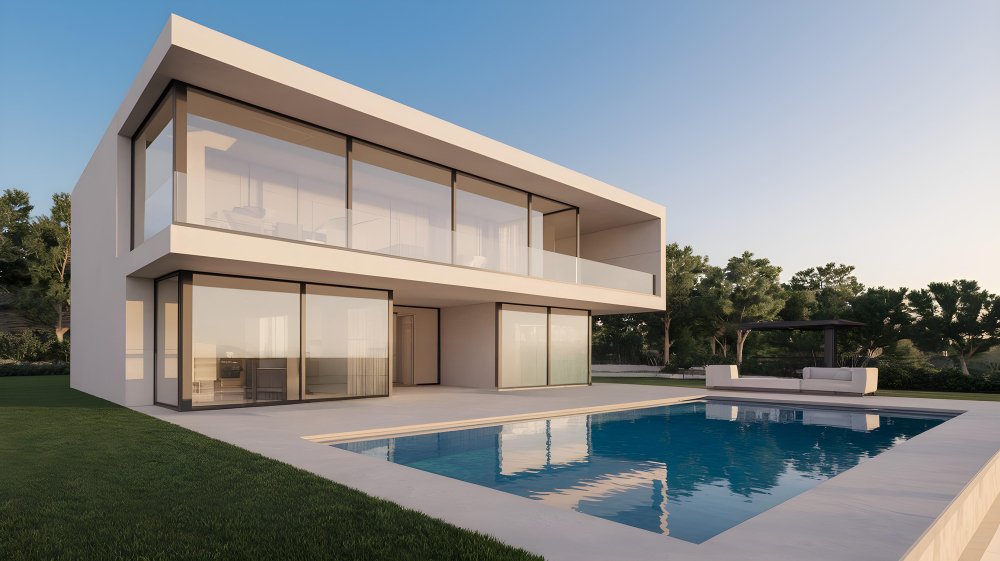Understanding Different Types of Properties – Choosing the right property is one of the most significant decisions you’ll make. Whether you’re a first-time buyer, an investor, or looking for a new place to call home, understanding the different types of properties available is crucial. This comprehensive guide delves into three popular options: apartments, villas, and plots, highlighting their unique characteristics, advantages, disadvantages, and suitability for various needs. By the end, you’ll have a clearer picture of which property type aligns best with your lifestyle and financial goals.

Understanding Different Types of Properties
Apartments: Vertical Living in Urban Hubs
Apartments, also known as flats, are individual housing units within a larger multi-story building. They are a common sight in urban areas and offer a distinct lifestyle compared to independent houses.
What Defines an Apartment?
An apartment typically consists of several rooms, including bedrooms, a living room, a kitchen, and bathrooms, all contained within a single, self-contained unit. Residents of an apartment building share common areas such as hallways, staircases, elevators, and sometimes amenities like gyms, swimming pools, and community halls. Ownership of an apartment grants you the right to the interior space, while the land and common structures are collectively owned by all residents or managed by a housing society or association.
Advantages of Choosing an Apartment
- Affordability: Generally, apartments are more affordable than villas or independent houses, especially in prime urban locations. The cost is shared across multiple units, making it an accessible entry point into the property market.
- Lower Maintenance: Exterior maintenance, security, and upkeep of common areas are usually handled by the housing society or management, reducing the burden and cost for individual owners.
- Security: Apartment complexes often have security personnel, CCTV surveillance, and gated access, providing a higher level of security compared to standalone properties.
- Amenities: Many apartment complexes offer a range of amenities like gyms, swimming pools, clubhouses, gardens, and children’s play areas, enhancing the quality of life.
- Community Living: Living in an apartment fosters a sense of community, with opportunities to interact with neighbors and participate in social events organized within the complex.
- Convenient Locations: Apartments are often located in or near city centers, offering easy access to workplaces, educational institutions, shopping malls, entertainment hubs, and public transportation.
- Investment Potential: Apartments in well-maintained complexes and prime locations can offer good rental yields and potential for capital appreciation.
Disadvantages of Apartment Living
- Limited Space and Privacy: Apartments generally offer less living space and privacy compared to villas or plots. You might have neighbors living above, below, and on either side.
- Restrictions and Regulations: Apartment living comes with rules and regulations set by the housing society or management, which might restrict renovations, pet ownership, or certain activities.
- Maintenance Charges: Residents have to pay monthly or annual maintenance charges for the upkeep of common areas and amenities, which can add to the overall cost of living.
- Limited Customization: You might have limited scope for customizing the exterior or making significant structural changes to your apartment.
- Parking Constraints: Depending on the complex and the number of vehicles you own, parking can sometimes be a constraint.
- Dependence on Others: You are dependent on the management for the upkeep of essential services and the resolution of community issues.
Who is an Apartment Best Suited For?
Apartments are an ideal choice for:
- First-time homebuyers: Offering an affordable entry into the property market.
- Young professionals and students: Providing convenient access to workplaces, educational institutions, and urban amenities.
- Small families and individuals: Offering a comfortable and manageable living space.
- Those seeking a low-maintenance lifestyle: Where exterior upkeep and security are taken care of.
- Investors: Looking for properties with good rental potential in urban areas.
Also Read: Maharashtra Eyes on 100% PMAY Success
Villas: Independent Living with Space and Privacy

Villas are independent, standalone houses that typically come with their own private land or garden. They offer a greater sense of space, privacy, and autonomy compared to apartments.
What Defines a Villa?
A villa is a self-contained residential unit, often detached, with its own compound or plot of land. The owner of a villa typically owns both the structure and the land it is built upon. Villas can range from single-story bungalows to multi-story mansions and often come with features like private gardens, lawns, parking spaces, and sometimes even private swimming pools.
Advantages of Choosing a Villa
- Greater Space and Privacy: Villas offer significantly more living space, both indoors and outdoors, providing ample room for families and greater privacy.
- Complete Ownership and Control: As the owner of both the house and the land, you have complete control over renovations, landscaping, and other modifications (within local building regulations).
- Customization Potential: Villas offer immense potential for customization and personalization, allowing you to design and build a home that perfectly suits your tastes and needs.
- Outdoor Space: The private garden or lawn provides a space for recreation, gardening, and outdoor activities.
- Parking Convenience: Villas typically come with dedicated parking spaces or garages, offering convenience for multiple vehicles.
- Higher Resale Value: Well-maintained villas in desirable locations often appreciate significantly in value over time.
- Lifestyle and Status: Owning a villa is often associated with a certain lifestyle and status, offering a sense of exclusivity and prestige.
Disadvantages of Villa Ownership
- Higher Cost: Villas are generally more expensive than apartments, both in terms of the initial purchase price and ongoing maintenance costs.
- Higher Maintenance Responsibility: Owners are responsible for all aspects of maintenance, including the house, garden, and any other structures on the property.
- Security Concerns: Depending on the location and the level of security measures in place, villas might be more vulnerable to security threats compared to gated apartment complexes.
- Location Challenges: Villas might be located further away from city centers and essential amenities, requiring personal transportation.
- Time and Effort: Maintaining a villa and its surroundings requires significant time, effort, and financial resources.
- Lower Community Interaction: Compared to apartment complexes, there might be less spontaneous interaction with neighbors in a villa community.
Who is a Villa Best Suited For?
Villas are an excellent choice for:
- Families seeking more space and privacy: Providing ample room for children and a comfortable living environment.
- Individuals who value independence and autonomy: Offering complete control over their property.
- Those who enjoy gardening and outdoor activities: With private gardens and lawns.
- High-net-worth individuals: Who can afford the higher purchase price and maintenance costs.
- Those looking for long-term investment and potential for significant capital appreciation.
Plots: The Foundation for Your Dream Home

Plots, also known as land parcels, are vacant pieces of land that can be purchased for various purposes, including building a residential property, commercial development, or agricultural use.
What Defines a Plot?
A plot is a demarcated area of land with defined boundaries. When you buy a plot, you own the land outright and have the freedom to develop it according to local regulations and your specific needs.
Advantages of Investing in a Plot
- Maximum Customization: Owning a plot gives you the ultimate freedom to design and build a home exactly as you envision it, without any pre-existing structures or layouts to work around.
- Potential for Appreciation: Land is a finite resource, and well-located plots can appreciate significantly in value over time, offering excellent investment potential.
- Lower Initial Investment (Potentially): In some cases, the initial cost of purchasing a plot might be lower than buying a ready-to-move-in apartment or villa, although development costs need to be factored in.
- Flexibility of Use: Depending on zoning regulations, a plot can be used for residential, commercial, or agricultural purposes, offering flexibility in its future use.
- No Maintenance Costs (Initially): Unlike apartments and villas, vacant plots generally do not incur ongoing maintenance costs until development begins.
- Long-Term Asset: Land is considered a stable and long-term asset that can provide security and potential for wealth creation.
Disadvantages of Investing in a Plot
- Development Costs and Time: Building a house on a plot involves significant time, effort, and financial investment, including design, approvals, construction, and landscaping.
- Infrastructure and Amenities: Plots in developing areas might lack essential infrastructure like roads, water supply, electricity, and sewage systems.
- Security Concerns: Vacant plots can be vulnerable to encroachment and illegal activities if not properly secured and monitored.
- Loan Acquisition Challenges: Securing loans for land purchase and construction can sometimes be more challenging compared to ready-built properties.
- Zoning Restrictions: The use of a plot is subject to local zoning regulations, which might restrict the type and size of construction allowed.
- Longer Timeframe for Returns: If you are looking for immediate returns, investing in a plot might not be the best option, as it takes time and investment to develop the land.
Who is a Plot Best Suited For?
Plots are a suitable choice for:
- Individuals who want to build their dream home from scratch: With complete control over design and construction.
- Long-term investors: Looking for potential capital appreciation over time.
- Developers and builders: For creating residential or commercial projects.
- Those with specific needs or preferences: That cannot be met by existing properties.
- Individuals with the time, resources, and patience for land development.
Making the Right Choice: Factors to Consider
Choosing between an apartment, villa, and plot depends on a multitude of factors specific to your individual circumstances and preferences. Consider the following:
- Budget: How much can you afford for the initial purchase and ongoing expenses?
- Lifestyle: What kind of living environment are you looking for? Do you prefer community living or more privacy?
- Space Requirements: How much living space do you need for your family and lifestyle?
- Location Preferences: Do you need to be close to your workplace, schools, or other amenities?
- Maintenance Preferences: Are you looking for a low-maintenance option or are you willing to handle upkeep?
- Future Goals: Are you looking for a place to live in, an investment property, or a long-term asset?
- Time Horizon: How soon do you need to move in? Are you willing to wait for construction?

